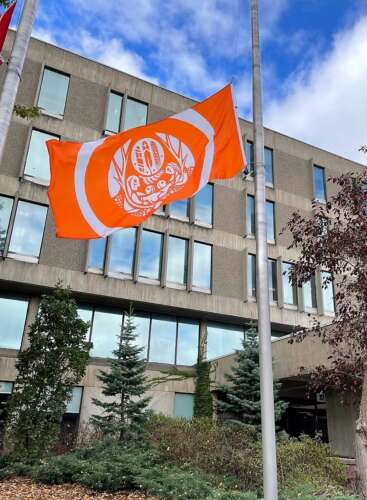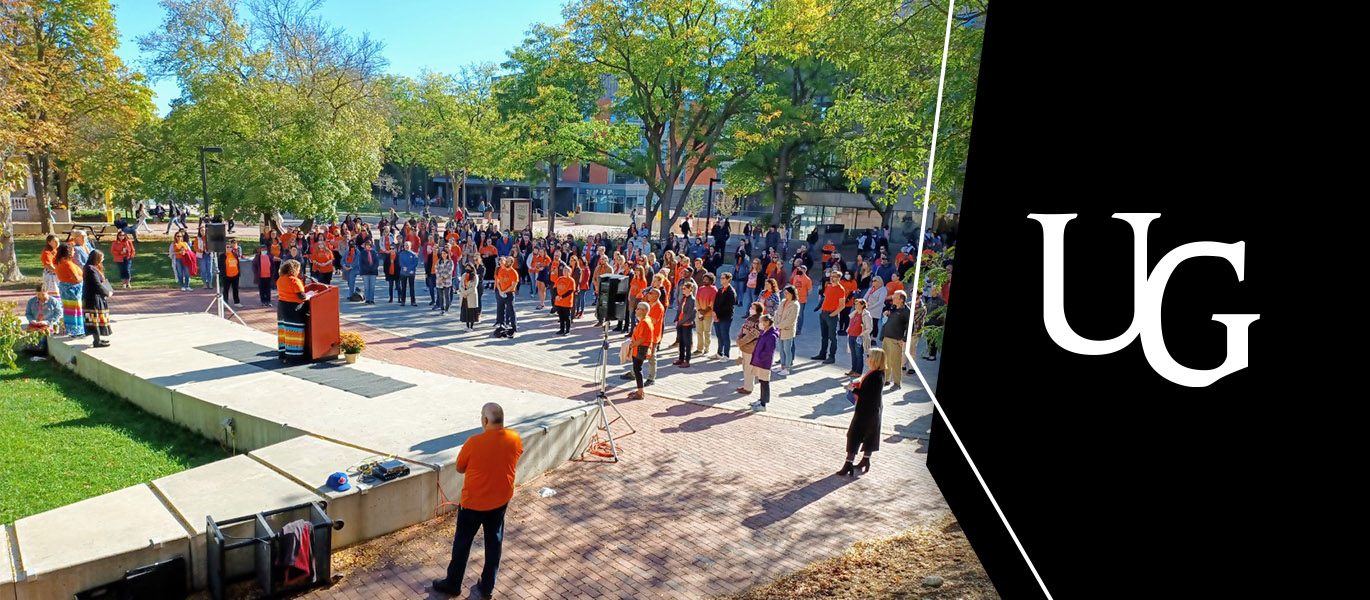
Truth and Reconciliation Week and the National Day for Truth and Reconciliation are opportunities to join together and reflect collectively on the atrocities and injustices that occurred within Canada’s residential school system and to remember the children who attended these schools and never returned home.
Also known as Orange Shirt Day, the national day is intended to deepen understanding of the trauma that affects the families and communities of survivors, to acknowledge the ongoing legacy of the residential school system and to commit to acts of decolonization and reconciliation.
Engaging in reconciliation is a shared responsibility. As a place of higher learning, U of G has an obligation to play a role in education and in examining the truth of history while working toward reconciliation with First Nations, Inuit and Métis peoples.
The University acknowledges this immense responsibility and, guided by the Indigenous Initiatives Strategy entitled “Bi-Naagwad | It Comes Into View,” is dedicated to its institutional priorities of indigenization and decolonization.
“Bi-naagwad’s suite of recommendations provides us with a framework for engaging in conversations about how we can meaningfully advance reconciliation, foster reciprocal and respectful relationships with First Nations, Inuit and Métis peoples, and actively respond to the truths shared by residential school survivors, their families and communities throughout the year,” said Cara Wehkamp, assistant vice-president (Indigenous initiatives).
The engagement of First Nations, Inuit and Métis peoples, cultures and ways of knowing has grown across U of G’s campus, but there is still much work to be done. Reconciliation is an active process and the University recognizes the need to evolve policies, programs and supports to ensure that Indigenous peoples have the opportunities to lead and thrive.
As part of its commitment to addressing discrimination and systemic inequity in education and research faced by First Nations, Inuit and Métis peoples, U of G has introduced more Indigenous student scholarships, bursaries and research opportunities.
“As a community dedicated to higher education, the University of Guelph embraces our responsibility to engage with the legacy of the residential school system and oppose discrimination against Indigenous peoples,” said U of G president Dr. Charlotte Yates. “At U of G, we are committed to reconciliation through actions that make higher education inclusive for First Nations, Inuit and Métis peoples and respectfully incorporate Indigenous knowledges, cultures and languages.”
Engaging in reconciliation
Public commemoration of the history and legacy of residential schools remains a vital component of the reconciliation process, said Yates. U of G will raise the Survivors’ Flag in front of the University Centre, and Johnston Hall will be lit in orange Sept. 26-30 to honour residential school survivors and affected communities.
The University will remain open on the National Day for Truth and Reconciliation to allow U of G community members to mark the day together.
On Sept. 30, flags will be lowered to half-mast. A community gathering called Reflections on Truth and Reconciliation will take place in Branion Plaza, 10-10:30 a.m.
Community members who are unable to join campus and community events are encouraged to take a moment for personal reflection during their day. Guidance for the U of G community on hosting reconciliation events can be found on the Truth and Reconciliation page of the University’s website.
The Indigenous Student Centre will host a Sharing Circle for First Nations, Inuit and Métis students on Sept. 27, 5:30-7 p.m. Indigenous Students can also drop in on Sept. 30, 9 a.m. to 4 p.m., at the Indigenous Student Centre, 620 Gordon St.
Related events at U of G have included:
A virtual tour of a former residential school
- The Woodland Cultural Centre will provide a virtual Zoom tour of the former Mohawk Institute Residential School on Sept. 26, 1-3 p.m. Viewers can learn about the 140-year-long history of the institution and listen to interviews from five survivors of the school.
- Registration required
Walk & Talk: Curatorial tour of Qautamaat
- On Sept. 28, 6:30-8:30 p.m., the Art Gallery of Guelph will host a curatorial tour of the exhibition “Qautamaat” with curator Taqralik Partridge and writer Emily Henderson. The tour will highlight the stories, ideas and practices associated with the “Inuit everyday” that inform the work of more than 80 artists and makers on view.
Wear orange on Sept 30
- To promote awareness of the legacy of the residential school system, wear an orange shirt or other item.
Explore the U of G Library’s curated collection
- Truth & Reconciliation Day 2022: Remembering the Children features works by First Nations, Inuit and Métis authors.
Respond to Calls to Action
- Students, staff and other members of the U of G community can also help work toward reconciliation by responding to the Truth and Reconciliation Commission’s Calls to Action and the National Inquiry into Missing and Murdered Indigenous Women, Girls and 2SLGBTQQIA Peoples Calls for Justice to help address Canada’s ongoing colonial legacy.
